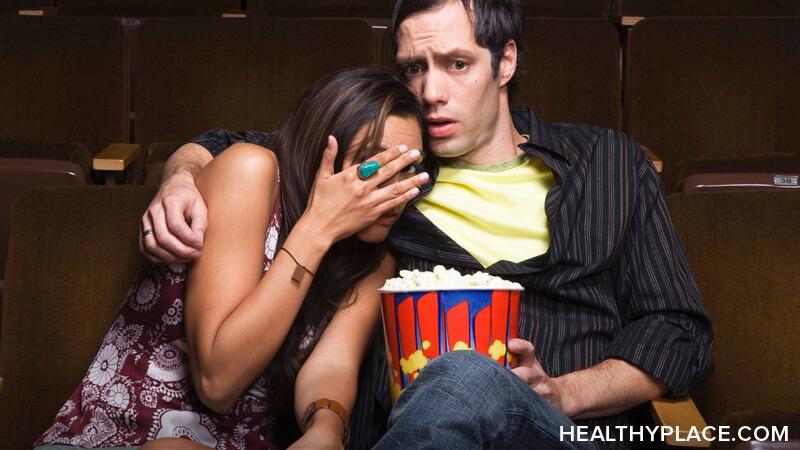Movies Romanticize Abuse Against Women: What's the Danger?

Violence and verbal abuse against women are romanticized in many Hollywood movies, but perhaps none so blatantly as in Fifty Shades of Grey. Unsurprisingly, given the story originated from Twilight fan fiction, the popular erotic novel and subsequent movie smacks of emotional abuse. What are the real-life effects of movies that romanticize abuse against women?
There are way too many examples of abusive behavior in prominent Hollywood blockbusters like Twilight and Fifty Shades, so, for now, we'll just focus on one clear contender: use of the isolation technique. Both movies demonstrate this technique in action, and here's how.
Examples of Movies Romanticizing an Abuse Technique
In Fifty Shades of Grey, Christian asks Anastacia to sign a nondisclosure agreement that says she cannot discuss their relationship with friends and family. He also gets jealous when she spends time with anyone but him, and the couple is rarely seen together in public. In Twilight, Edward is jealous when Bella spends time with her friend Jacob, so much so that he damages her car so she can't go and meet him.
I feel strongly about this topic because if I'd watched either of these movies when I was in an abusive relationship, they would have only pulled the wool further over my eyes. Far from peddling the romantic fantasies depicted on the movie posters, the controlling relationships these movies depict are (or were) a brutal reality for many women, myself included.
What Effect Do Movies that Romanticize Abuse Have on Abuse Victims?
It's staggering that movies that romanticize abuse remain so oblivious (or uncaring) of the message they're sending into our society -- a society already littered with subtle endorsements of male dominance over women. Defenders of movies like Fifty Shades of Grey and Twilight will argue that the audience can differentiate between what they see on screen and what happens in real life -- but the trouble is, many of them can't.
Granted, some people are more impressionable than others, but I consider myself an educated, self-aware, open-minded feminist; yet, if I'd watched this movie when I was in an abusive relationship a few years ago, I can tell you the exact effect it would have had on me. I would have said to myself:
- "See, this does happen in other relationships."
- "It just means he has an intense, uncontrollable passion and love for you, like Christian Grey."
- "You just have to accept this about him."
- "If you stay with him despite his abuse, he will change eventually. You will be the one to change him, like Ana."
I might be articulating myself in overly-simplistic terms here, but you get my point. I was impressionable, vulnerable, and in love. I would have fallen for this idea of what romance should be because I wanted to believe my struggle was worthwhile. I needed to reframe the awful relationship I was in, to make myself believe that the man I loved was damaged and that I was the only one who could fix him.
Why Are Movies that Romanticise Abuse Dangerous to Victims of Abuse?
Victims of verbal and physical abuse are impressionable to the message that movies that romanticise abuse give because they want to be. They want to believe what the movies are telling them. They want to think that their abusers will change, that their acts of violence and verbal abuse are merely an emotionally damaged person's expression of love. They want to believe that they, themselves, are enough to change their abusive partners into raw, emotionally available men.
According to Melissa Henson, Director of Communication and Public Education for the Parents Television Council, Hollywood has a dangerous habit of implying that these volatile relationships are more intense, more passionate than your average romance. Sadly, these "intense" relationships usually lead to violence.
To impressionable teens, domestic violence is almost romanticized. We’ve made great strides in recent years in clearly communicating the message that is never okay to hit a woman. Today, the hidden message in the entertainment consumed by many impressionable teens is that if he hits you, it is out of love – which is absolutely wrong.
My worry is that domestic violence in the media has become so normalized and so mainstream that we no longer recognize it. These films endorse abuse against women and make young men think that women crave control and dominance in a relationship. To young women, these male leads seem glamorous and brooding and a challenge to be met rather than selfish, manipulative and, quite frankly, dangerous men who will only bring them emotional and physical pain.
Are Twilight or Fifty Shades of Grey just harmless fantasy, or do the characters of Edward Cullen and Christian Grey romanticise abuse and perpetuate abuse culture? Let me know your thoughts.
RESOURCE
Fox News,Hollywood Perpetuating Dangerous Images of Domestic Violence in Teen Romances, 2011
APA Reference
Smith, E.
(2017, December 26). Movies Romanticize Abuse Against Women: What's the Danger?, HealthyPlace. Retrieved
on 2026, March 5 from https://www.healthyplace.com/blogs/verbalabuseinrelationships/2017/12/movies-romanticize-abuse-against-women-whats-the-danger
Author: Emma-Marie Smith
Hi I’m writing a paper for college on domestic violence do you think we could chat
Emma, I LOVED, loved, loved, this article. Well done. It's so spot on. You're absolutely correct that the women that these movies are dangerous for are the ones that are already bargaining with the idea that maybe the abuse is a sign of passionate devotion or that a man with issues that bad just need help and compassion. It IS dangerous, specifically for women who are already thinking this way. It's easier for them to think that way, it feels better to think the abuse is out of crazy love than it is deeply rooted issues that likely have nothing to do with you at all. Ahh I could honestly go on and on. Love this one girl. -Emily